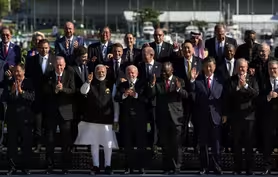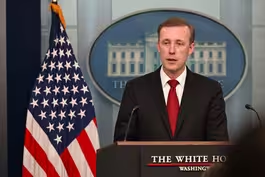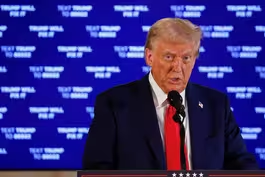
Tamara Keith and Amy Walter on the fight over Trump's picks
Clip: 11/18/2024 | 8m 58sVideo has Closed Captions
Tamara Keith and Amy Walter on the fight over Trump's Cabinet picks
NPR’s Tamara Keith and Amy Walter of the Cook Political Report with Amy Walter join Amna Nawaz to discuss the latest political news, including President-elect Trump's Cabinet picks that are sparking controversy, how voters feel about the economy and the Biden administration's attempts to protect his accomplishments.
Problems playing video? | Closed Captioning Feedback
Problems playing video? | Closed Captioning Feedback
Major corporate funding for the PBS News Hour is provided by BDO, BNSF, Consumer Cellular, American Cruise Lines, and Raymond James. Funding for the PBS NewsHour Weekend is provided by...

Tamara Keith and Amy Walter on the fight over Trump's picks
Clip: 11/18/2024 | 8m 58sVideo has Closed Captions
NPR’s Tamara Keith and Amy Walter of the Cook Political Report with Amy Walter join Amna Nawaz to discuss the latest political news, including President-elect Trump's Cabinet picks that are sparking controversy, how voters feel about the economy and the Biden administration's attempts to protect his accomplishments.
Problems playing video? | Closed Captioning Feedback
How to Watch PBS News Hour
PBS News Hour is available to stream on pbs.org and the free PBS App, available on iPhone, Apple TV, Android TV, Android smartphones, Amazon Fire TV, Amazon Fire Tablet, Roku, Samsung Smart TV, and Vizio.
Providing Support for PBS.org
Learn Moreabout PBS online sponsorshipAMNA NAWAZ: Let's return now to the presidential transition and some of president-elect Trump's Cabinet picks that are sparking controversy.
For that, we're joined now by our Politics Monday team.
That is Amy Walter of The Cook Political Report With Amy Walter and Tamara Keith of NPR.
Great to see you both.
AMY WALTER, The Cook Political Report: Hello.
TAMARA KEITH, National Public Radio: Good to be here.
AMNA NAWAZ: Let's start now with some of the lingering questions over lack of qualifications, some ethical concerns over some of those nominees, everyone from Matt Gaetz, congressman from Florida, of course, who is nominated for attorney general, Pete Hegseth, who is the nominee for secretary of defense.
You both know we're waiting to see if that House Ethics Committee report into Matt Gaetz will be released or not.
We don't yet know.
But, Tam, what do you think?
Because Republican senators are saying they want to see it.
Will we see it?
TAMARA KEITH: Yes, and Republican senators are also saying he deserves a fair hearing.
Well, a fair hearing involves being asked difficult questions under oath with cameras rolling.
Now, Matt Gaetz is someone who has proven to have a very high pain tolerance in politics, an incredibly high pain tolerance.
He is willing to pick the fights.
He is willing to have almost every member of the House openly hate him.
He is totally OK with that.
He enjoys being sort of a Trump era supervillain and he leans into it.
So whether that report is released or not, I don't have any great insight.
I will say that someone who served in the Trump administration NPR's air this morning said Congress leaks like the Titanic.
And I think that's fair.
Usually things get out.
And even if they don't, there is already a huge amount of information in the public discourse about what Congressman Gaetz was being investigated for.
And there is already pressure being put on Republican senators to just pass through everybody.
AMNA NAWAZ: Yes.
Amy, what about that pressure?
Because the Trump team insists and president-elect Trump insists these are his picks.
This is who he wants.
Is this a test for senators and really for Senator John Thune, the newly elected leader?
AMY WALTER: We are now how many years in this?
We're eight years into Donald Trump.
If you are a United States Senator, a Republican United States Senator, and you haven't already figured out where your lines are that you're going to draw, then that's a problem.
It was -- in 2017, you could be surprised.
Oh, wait, what?
He said this, he did that.
Responding to tweets, how am I going to respond to this?
How am I going to respond to that?
By now, this is all pretty predictable, his unpredictability.
And so I think we're going to see a lot of this about picking your fights, deciding which are the things for which you're going to go and either make enemies with Donald Trump or you're going to split with the party and which things you're going to go along with, even where you might disagree.
What's fascinating to me too is watch how Democrats are responding to a lot of these picks as well, where you're hearing people like Senator John Fetterman saying, let's not just go crazy with every one of these picks.
You see Jared Polis, the governor of Colorado, having nice things to say about RFK Jr.
I think both Democrats and Republicans now coming to the realization that this is about picking the right battles at the right time.
AMNA NAWAZ: There's also this very real possibility, Tam, and I have been playing it out in my head, that the report is released, and it doesn't make a difference.
TAMARA KEITH: Yes.
AMNA NAWAZ: Because we are now living in an era where the president-elect was formally bragging about sexual assault.
He was convicted, held libel for sexual abuse as well.
So are senators here sort of -- is there a line, as Amy says here, that they're trying to walk?
Do they cede their power if they just kind of rubber-stamp everyone now?
TAMARA KEITH: Well, I think that the challenge right now is for Republicans, who will have the majority in the Senate -- like, Democrats only have so much say here, like none.
This is up to Republicans.
This is an inter-Republican fight, and it may not be a fight at all, because how much political capital do they want to spend on this, this early on?
AMY WALTER: On this versus something else that is much more important maybe to them or to their constituencies going forward.
AMNA NAWAZ: Let me ask you too about where we are on the economy and how people feel about it, more importantly, because we have seen already-improving markets, Amy, have now gotten better.
They have rallied since the election.
There's optimism in the markets.
It's driven by expectations of lower taxes, fewer regulations.
So the vibes have shifted.
And there's real-time consumer sentiment that's shifted too, even though nothing has dramatically changed in the market.
AMY WALTER: Yes.
AMNA NAWAZ: Was it just politics all along?
AMY WALTER: No, you know what?
There was a great study by the Michigan Consumer Federation -- or the consumer sentiment, looking at, for example, the shift based on, in your opinion, as a consumer of the economy based on your partisanship.
AMNA NAWAZ: Yes.
AMY WALTER: And the biggest gap that they had measured was right after the 2016 election, where, going into that election, Republicans thought the economy was terrible, Democrats thought it was great.
By the time it got to February of 2017, it had completely flipped, even though nothing had happened.
So partisanship is a big piece of this.
But I do also think that so much of the concern about the economy is real, is continuing to be felt by Americans, and the cost of stuff, the cost of housing specifically being a real weight for voters.
Now, there are also plenty of people who don't feel great about the economy or maybe do feel OK about the economy who didn't vote.
So we can't just look at those folks who showed up and voted as an example of how the broad electorate or maybe the broad population feels about the state of the economy.
AMNA NAWAZ: Tam, how do you see it?
TAMARA KEITH: Yes, and I think that it's been a long time now that politics basically broke economic perception.
And I would take this all the way back to 2012 when I was out in Ohio interviewing voters, and Republicans told me the economy was terrible, Democrats told me the economy was OK. And it was all about perceptions of then President Obama.
Well, flash forward and what has changed since voting happened two, three weeks ago?
Almost nothing, except that people who support Donald Trump now believe things are going to get better.
They have more optimism than they had before.
Meanwhile, President Biden is still in office.
So Democratic perception of the economy hasn't had time to turn yet.
AMY WALTER: Also, I will note that even a good economy for Donald Trump didn't necessarily work to his favor, whether it was in the 2018 midterms or whether it was in 2020, where majority of voters said they approved of the job he was doing on the economy.
That didn't help him win the election.
AMNA NAWAZ: Meanwhile, we're in the final weeks of the Biden administration.
Tam, there's a lot to talk about what the president could be doing right now, what they are prioritizing, should be prioritizing to sort of Trump-proof some of what they see as their accomplishments of the last four years.
What do you know about that?
TAMARA KEITH: Well, a lot of what they have been doing, they have been doing for a long time.
They have been trying to Trump-proof it for literally years at this point, in part because a lot of what the Biden administration has done has been through a rulemaking process.
That takes something like 18 months to get a rule all the way through the works.
And so one just small example here is that, as President Trump was leaving office the last time, they tried doing the Schedule F thing to change the way civil servants were classified to try to put in more political appointees and fewer civil servants in these jobs.
And Biden immediately came in and rescinded that, reversed it, but then they created a new rule.
They went through this lengthy rulemaking process to create a new rule to make it harder to go back and do what Trump did before.
So, if the Trump administration wants to undo it, in theory, they have to do their own new rule or legislation, but it's something that would take, again, another 18 months.
AMY WALTER: Longer time, yes.
And they are also, on a shorter time frame... TAMARA KEITH: Yes.
AMY WALTER: ... trying to fill as many judicial vacancies as possible.
Remember, when Donald Trump came in, in 2017, there was something like 130 openings and vacancies.
Now it's going to be down to the 30s.
So there's that, and then getting money out the door, especially when it comes to provisions for clean energy programs that were passed in the Inflation Reduction Act.
What Democrats want to do is make sure that money gets allocated and spent, because Trump, as well as Republicans in the Senate, are talking about clawing it back to help pay for some of the things that they want to do, specifically making the tax cuts permanent.
AMNA NAWAZ: We will see.
AMY WALTER: Yes.
AMNA NAWAZ: Amy Walter and Tamara Keith, always great to see you both, start the week off with you.
AMY WALTER: Thank you.
AMNA NAWAZ: Thank you so much.
TAMARA KEITH: You're welcome.
Attacks on Israeli soccer fans heightens antisemitism fears
Video has Closed Captions
Clip: 11/18/2024 | 6m 21s | Attacks on Israeli soccer fans heightens antisemitism fears (6m 21s)
Ghana becomes dumping ground for the world's used clothes
Video has Closed Captions
Clip: 11/18/2024 | 8m 43s | Ghana becomes dumping ground for the world's unwanted used clothes (8m 43s)
Political divisions threaten bill to protect press freedom
Video has Closed Captions
Clip: 11/18/2024 | 5m 58s | How political divisions are threatening a bipartisan bill to protect press freedom (5m 58s)
Sullivan says role in defending Ukraine defines Biden legacy
Video has Closed Captions
Clip: 11/18/2024 | 10m 35s | 'Kyiv Stands': Sullivan says U.S. role in defending Ukraine defines Biden's legacy (10m 35s)
Will the Senate serve as a check on Trump's power?
Video has Closed Captions
Clip: 11/18/2024 | 5m 18s | Will the Senate serve as a check on Trump's power or pave the way for his agenda? (5m 18s)
Providing Support for PBS.org
Learn Moreabout PBS online sponsorship
- News and Public Affairs

FRONTLINE is investigative journalism that questions, explains and changes our world.

- News and Public Affairs

Amanpour and Company features conversations with leaders and decision makers.












Support for PBS provided by:
Major corporate funding for the PBS News Hour is provided by BDO, BNSF, Consumer Cellular, American Cruise Lines, and Raymond James. Funding for the PBS NewsHour Weekend is provided by...




